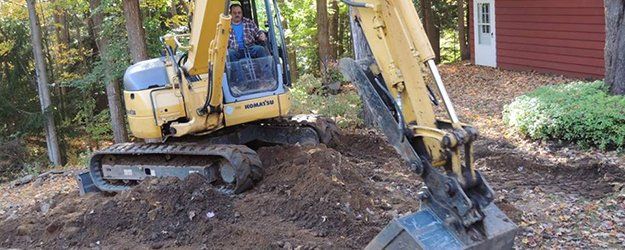Dump Truck Companies in Ohio - Reliable Dump Truck Services Across Ohio
Dump Truck Companies in Ohio - Reliable Dump Truck Services Across Ohio
Blog Article
Comprehensive Excavation Strategies: Mastering the Basics for Success
The careful planning, precise implementation, and meticulous attention to detail needed in excavation tasks require a comprehensive approach that encompasses various essential elements. The real mastery lies not simply in comprehending these principles yet in effortlessly integrating them to navigate the intricacies of excavation tasks with skill.
Understanding Excavation Project Planning

Successful excavation projects are developed on the structure of complete and careful planning. The first stage of any type of excavation task is the preparation phase, where critical choices are made that can dramatically impact the result of the job. Throughout this stage, it is important to collect all pertinent information concerning the site, consisting of topographical surveys, dirt make-up, and any potential threats that may exist. Understanding the task spending plan, scope, and timeline restraints is essential for producing a comprehensive excavation plan that makes certain the project's success.
One secret facet of excavation project planning is the growth of a thorough timeline that describes the series of due dates, tasks, and turning points. This timeline acts as a roadmap for the task team, permitting them to track progression and make essential adjustments to make sure the task remains on schedule. Furthermore, a distinct budget that represents all expenses, consisting of equipment leasing, labor costs, and products, is crucial for staying clear of expense overruns and delays. By thoroughly considering all these variables during the drawing board, excavation jobs can be carried out efficiently and effectively, bring about effective end results.
Soil Analysis and Website Evaluation
Performing comprehensive soil evaluation and website assessment is a crucial action in the preparation stage of any kind of excavation job. Soil analysis includes identifying the composition, framework, and buildings of the soil at the excavation site. This details is essential for comprehending the dirt's bearing ability, dampness content, and potential for erosion, which are essential aspects in establishing the excavation methods and equipment required for the task.
Website evaluation surpasses dirt evaluation and encompasses a more comprehensive evaluation of the general site problems. This analysis includes recognizing any possible risks, such as underground utilities, environmental problems, or unstable terrain, that could impact the excavation process. By completely evaluating the site, task supervisors can establish reliable excavation strategies that prioritize safety, performance, and environmental management.
Using innovative innovations like ground-penetrating radar, dirt tasting, and drone surveys can improve the precision and performance of soil analysis and website evaluation. Spending time and resources in these preliminary steps can eventually save time and prevent pricey hold-ups or issues during the excavation process.
Equipment Option and Application
Reliable excavation projects count heavily on tactical tools option and utilization to make certain ideal efficiency and performance. Picking the best devices for the job is crucial in making best use of effectiveness and minimizing downtime. Variables such as the kind of soil, deepness of excavation, and project range play a considerable role in determining the most appropriate tools for the task available.

In addition to picking the appropriate equipment, proper utilization is essential to project success. Operators should be trained to deal with the equipment safely and efficiently - excavating ohio. Routine maintenance checks and timely repair services assist protect against breakdowns and ensure constant performance throughout the project
Precaution and Regulations Conformity
In the world of excavation jobs, focusing on precaution and compliance with laws is paramount to ensuring a safe and lawfully audio operational environment. Precaution include a variety of methods, including performing comprehensive website assessments, carrying out correct signs and barriers, and providing ample security training for all personnel associated with the excavation procedure. Adherence to regulations, such as OSHA needs in the United States, ensures that the excavation task fulfills the essential requirements to shield employees, onlookers, and the surrounding atmosphere.

Monitoring Progression and Adjusting Approaches
How can project supervisors effectively track the improvement of excavation tasks and adjust their techniques as necessary to enhance end results? Tracking development is crucial for ensuring that excavation projects remain on track and satisfy due dates. Task managers can make use of different tools and techniques to track development, such as daily report card, routine website examinations, and progressed monitoring modern technologies like drones and GPS tracking systems. By continuously monitoring the project's development, managers can recognize any possible delays or concerns at an early stage and take aggressive steps to resolve them.

Final Thought
In final thought, understanding the basics of detailed excavation methods is vital for the success of any type of project. By understanding task planning, assessing soil and website conditions, selecting proper devices, abiding by safety and security policies, and checking development, project supervisors can make certain a effective and smooth excavation process. Applying these strategies will certainly bring about effective end results and lessen possible threats or problems during the excavation task.
The first stage of go to this website any type of excavation job is the planning stage, where crucial decisions are made that can considerably affect the result of the project. Comprehending the project timeline, budget plan, and extent constraints is important for creating a detailed excavation plan that makes certain the task's success.
Just how can project managers efficiently track the advancement of excavation projects and adapt their methods as necessary to maximize end results? By very closely keeping track of progression and being eager to adjust techniques, task managers can improve the general success of excavation tasks.
By understanding job planning, assessing soil and site problems, selecting ideal equipment, complying with safety and security regulations, and monitoring development, project supervisors can guarantee a effective and smooth excavation process.
Report this page